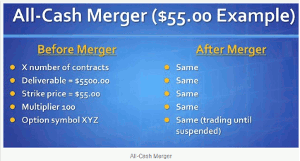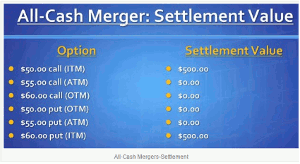For the benefit of all newbies ready to take their options education to the next level, Alan Ellman, of TheBlueCollarInvestor.com, shares the first of his two-part series covering a cause for contract adjustments that change covered call and put-selling positions; mergers and acquisitions.
Contract adjustments will change our covered call writing and put-selling positions. In the past, I have written about the effect stock splits and dividends have on our positions. In this article, I will highlight another cause of these adjustments, mergers and acquisitions (M&A). This is a corporate event where two companies are joined into one or one company purchases another. In both instances, option contracts will change based on decisions made by panels from the Options Clearing Corporation (OCC), with a goal of making option buyers and sellers “whole.” Part I of this two-part series will detail All-Cash Mergers.
Terms Involved with Contract Adjustments
Deliverable: The unit of trade, generally 100 shares per contract for unadjusted contracts.
Option Symbology: Includes stock symbol, expiration date, C or P for call or put option and strike price in dollar and cents as shown in the chart below:
Aggregate Exercise Amount (aggregate contract value): This is the total amount paid or received for the deliverable and is generally the strike price x 100. For example, if a $55.00 call or put was bought or sold, the aggregate exercise amount is $5500.00 per contract.
Potential modifications to contract terms depending on corporate events
- Number of shares deliverable
- Strike price
- Multiplier
- Option symbol
All-Cash Merger
Let’s assume Company XYZ is merging into BCI and BCI is paying $55.00 per share for every share of XYZ. For every 100 shares owned post-merger, the shareholder will receive $5500.00. Prior to the merger, shares of XYZ changes hands, not cash. Upon consummation of the merger, trading of the XYZ stock and options halt simultaneously and exercise of XYZ calls and puts are based on the OCC’s cash settlement system where all in-the-money strikes have value and at-the-money and out-of-the-money strikes have no value. More on this later. The following screenshot breaks down the option status before and after the cash merger:
The effective date is the day after the consummation date and option contracts will be cash-settled. For example, if XYZ was trading at $60.00, the cash deliverable for the $55.00 call option is $6000.00, $500.00 more than the aggregate contract value. Cash settlement for this, now, in-the-money strike is $500.00. All strikes at-the-money or out-of-the-money expire worthless (the chart below shows both call and put options):
Discussion
It is important to understand how corporate events can alter our option-selling positions. Contract adjustments are determined by OCC panels and are changed based on the specific terms of the event. In Part II of this series, we will be detailing with stock and cash mergers. More information on specific mergers can be gleaned from our brokers or by calling the OCC at 1-888-678-4667.
By Alan Ellman of TheBlueCollarInvestor.com













